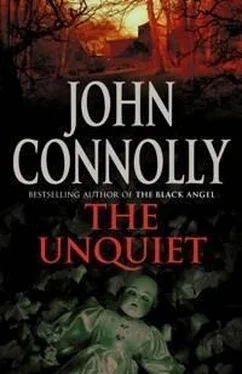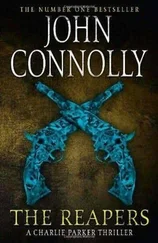Everything about Gilead spoke of loss and decay and corruption. Had I not been aware of the crimes that were committed here, the children who had suffered, and the infants who had died, it would still have left me feeling uneasy and soiled. True, there was a kind of grandeur to the half-built church, but it was without beauty, and even nature itself seemed to have been corrupted by its contact with this place. Dubus was right. Lumley had chosen badly for the site of his community.
As Angel moved to examine the church more closely, I stopped him with my hand.
“What’s the matter?” he said.
“Don’t touch any of the plants,” I said.
“Why not?”
“They’re all poisonous.”
And it was true: it was as though every foul weed, every noxious flower, had found a home here, some of which I had never seen before this far north, or clustered together in this way. There was mountain laurel, with its shredded, rusty bark, its pink-and-white flowers, dotted with red like the blood of insects and with stamens that responded to the touch like insects or animals, now absent. I saw white snakeroot, some of its flowers still in their final bloom, that could render cow’s milk fatal to drink if the animal fed upon the plant. Near a patch of marsh, iced over at its banks, water hemlock, all toothed leaves and streaked stems, beckoned, each part of it potentially lethal. There was jimson weed, which belonged more properly in fields, and celandine, and stinging nettles. Even the ivy was poison. No birds would ever come here, I thought, not even in summer. It would always be a silent, desolate place.
We stared up at the massive steeple, its peak higher even than the trees around it. Sections of the alcove windows glared darkly over the forest through layers of ivy, and the empty alcove intended to house the bell was now almost entirely covered by the plant. There were no doors, merely rectangular gaps at the base of the steeple and at one side of the church itself, and no glass filled the windows. Even to attempt to enter would be to invite cuts and stings from the weeds and nettles that blocked the way, although when I looked closer it did appear that someone had, at some point, cut a way through, for the weeds were taller and thicker at the sides. To the west of the church, I saw the remains of a trail that had been cut through the forest, its path clear from the absence of tall trees. That was how they had transported the building materials into the forest, but half a century later all that was left was a divide conquered by shrubs.
We walked over to the intact house. I nodded to Angel, and he began working on the lock.
“Hasn’t been opened in a while,” he said. He took a small can of WD-40 from his jacket pocket, sprayed the lock, then went at it again. After several minutes, we heard a click. He applied pressure to the door with his shoulder, and it creaked open.
There were two rooms inside, both empty. The floor was concrete, and was clearly not part of the original structure. The sun, which had struggled for so long to shine through the filthy glass, now took the opportunity afforded by the open door to bathe the interior with light, but there was nothing to see and nothing to illuminate. Louis tapped one of the windows lightly with his knuckle.
“It’s Plexiglas,” he said. He traced his finger around the edge of the frame. It looked like someone had once tried to chip away at the cement holding it in place. They hadn’t gotten far, but the evidence of the failed attempt still remained.
He leaned in closer to the glass, then knelt, trying to get a clearer look at something that his sharp eyes had picked out.
“Look here,” he said.
There were tiny marks scratched upon it in the bottom right-hand corner. I moved my head in an effort to see what they might be, but it was Angel who deciphered them first.
“L. M.,” he said.
“Lucy Merrick,” I said. It had to be. There were no other markings on the walls or the windows. Had the letters been carved by a kid seeking a thrill, there would have been other initials, too, other names. But Gilead was not a place to come to alone, not willingly.
And I knew then that this was where they had taken Andy Kellog and, later, Merrick ’s daughter. Andy Kellog had come back damaged, traumatized, but still alive. Lucy Merrick, though, had never returned. Instantly, the air in the house smelled stale and dead to me, infected by what I knew in my heart had occurred in its rooms.
“Why here?” said Louis, softly. “Why did they bring them here?”
“Because of what happened before,” said Angel. He touched his finger to the marks made by Lucy on the glass, tracing each one carefully and tenderly in an act of remembrance. I thought of my own actions in the attic of my house, reading a message written in dust. “It added to the pleasure, knowing they were repeating something that had been done in the past, like they were continuing a tradition.”
His words echoed Christian’s talk of “clusters.” Was that what lay behind Clay’s fascination with Gilead? Did he want to re-create the events of half a century before, or did he help others to do so? Then again, perhaps his interest was not prurient or lascivious. Maybe he wasn’t to blame in any way for what had happened, and only his professional curiosity drew him to this site deep in the woods, haunting his memory and finding form in the pictures that Merrick had torn apart on Joel Harmon’s wall, and that Mason Dubus proudly displayed on his. But I was starting to believe that less and less. If men had sought to re-create the original crimes here, then perhaps they would have sought out their instigator, Mason Dubus. I was aware that we were following a path trodden by Clay, tracing the marks that he had left as he moved north. He had given one of his precious artworks to Dubus. It did not seem like a mere act of thanks. It was closer to a gesture of respect, almost of affection.
I walked through the two rooms, looking for any further trace of Lucy Merrick’s presence in that house, but there was none. There had probably been mattresses once, blankets, even some books or magazines. There were light switches on the walls, but the sockets were bare of bulbs. I saw marks in the upper corner of the second room, where a metal plate of some kind had been held in place, a neat hole drilled below them. A larger hole in the wall, since filled in but its shape still visible, indicated the spot where a stove had once stood, and the fireplace had long ago been bricked up. Lucy Merrick had disappeared in September. It must already have been cold up here. How did she stay warm, if this was where they had kept her? I could find no answer. Everything had been removed, and it was clear too that these rooms had not been used for many years.
“They killed her here, didn’t they?” asked Angel. He was still by the window, his fingers maintaining contact with the carved letters on the glass, as though by doing so he could somehow touch Lucy Merrick herself and comfort her, so that, wherever she was, she might know that someone had found the marks she had left and was grieving for her. The letters were small, barely there. She did not want the men who had abducted her to see them. Perhaps she believed they would provide proof of her story when she was released, or did she fear, even then, that she might never be freed, and she hoped these letters might provide some sign in case anyone cared enough about her to try to discover her fate?
“They didn’t kill any of the others,” I said. “That’s why they wore masks, so they could let them go without worrying about being identified. They might have taken it a step further, or something could just have gone wrong. Somehow, she died, and they cleared away any sign that anyone had ever been here, then locked it up and never came back again.”
Читать дальше












